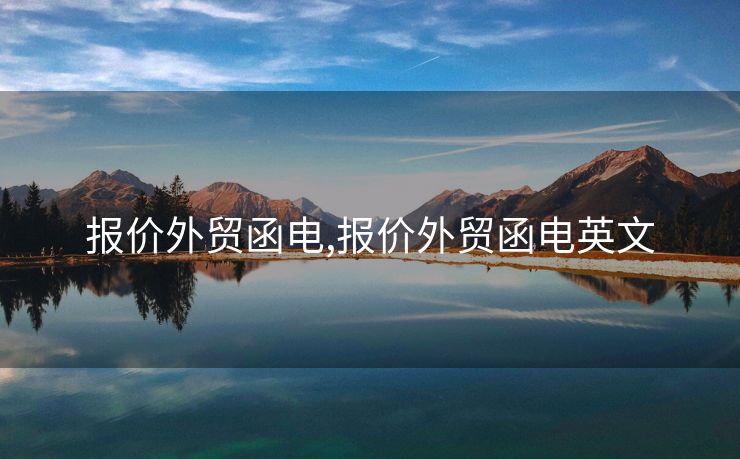报价外贸函电,报价外贸函电英文

What is a quotation in foreign trade?
A quotation in foreign trade refers to a formal document or letter that contains the price, terms, and conditions of a product or service being offered by a seller to a buyer. It is an essential communication tool used in international business to provide potential buyers with all the necessary information they need to make purchasing decisions.
Why are quotations important in international trade?
Quotations play a crucial role in international trade for several reasons:
- They provide buyers with detailed information about the products or services being offered, including specifications, quantities, and pricing.
- They allow buyers to make comparisons between different suppliers and choose the most suitable one.
- They serve as a basis for negotiation and can help both parties reach a mutually beneficial agreement.
- They establish transparency and trust between buyers and sellers, as all terms and conditions are clearly stated.
What should be included in a quotation in foreign trade?
A well-prepared quotation should include the following information:
- Product or service details: Provide a clear description of the product or service being offered, including specifications, dimensions, and any unique features.

- Pricing: Clearly state the unit price, total price, and applicable currency. If there are any discounts or additional charges, such as shipping or taxes, they should be clearly mentioned.
- Payment terms: Specify the accepted payment methods, such as bank transfers, letters of credit, or online payment platforms. Include any required down payments or payment milestones.
- Delivery terms: Indicate the delivery time, shipping method, and any additional costs related to transportation or insurance.
- Validity period: State the duration for which the quotation is valid to protect against sudden price changes in the market.
How to create an effective quotation in foreign trade?
To create an effective quotation in foreign trade, follow these tips:
- Understand the buyer's requirements: Gather all the necessary information about the buyer's needs and preferences to tailor the quotation accordingly.
- Be transparent: Provide accurate and detailed information about the product or service, pricing, and terms. Avoid using vague or misleading language.
- Be competitive: Research the market to offer a competitive price without compromising on quality. Highlight any unique selling points or advantages of your product or service.
- Respond promptly: Time is often critical in international trade. Aim to provide the quotation within a reasonable timeframe to demonstrate your professionalism and commitment.
- Follow up: After sending the quotation, follow up with the buyer to address any questions or concerns they may have. This shows that you value their business and are willing to provide further assistance.
Conclusion
In summary, quotations in foreign trade are essential tools for communicating product or service information, pricing, and terms between buyers and sellers. By providing comprehensive and transparent quotations, businesses can effectively attract potential buyers, establish trust, and ultimately secure international trade opportunities.


